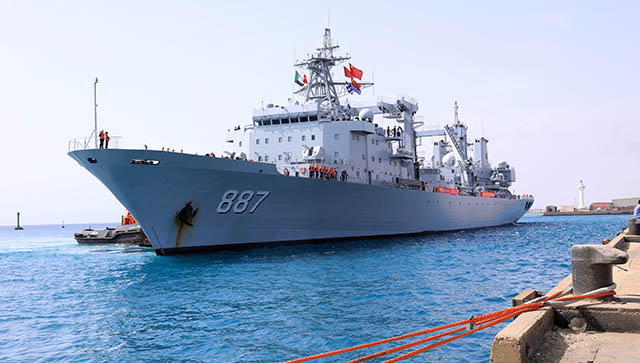West Asia is like a tinderbox right now. There are multiple stakeholders - heavily armed and not shy of using force. It is a volatile cocktail of violence and politics. What could make it worse?
Try Chinese warships. They’re already there, six of them. It’s not clear when they arrived, but last week they made their presence known. A Chinese naval task force was spotted in the Gulf. It had three warships - one destroyer, one frigate and one supply ship. Together, they were a task force. It made two stops - Oman and Kuwait. Now, these ships had some serious firepower. The destroyer is what China calls “the Zibo”. It can launch guided missiles and also has advanced radar and electronic equipment. Their last stop Muscat, the capital of Oman. We cannot confirm where they went after that. So that’s one team with three ships. There’s a second one of three warships again. They were spotted earlier this month. They escorted a cargo ship from Panama. Their current status is not clear but by all accounts, they’ve not left the region. In other words, as the war between Israel and Hamas escalates, China has six warships in West Asia and what are they doing there? Fuelling a lot of speculation, among other things. Experts are describing a range of possibilities like the evacuation of Chinese citizens. But it makes little sense because Beijing is not evacuating its citizens. Yes, it has asked Chinese nationals to leave Israel but it not arranging any chartered flights for them. China has told its citizens to “find their own way home”. Also, you don’t need six warships to bring your people to safety. Another possibility is cargo protection. Using ships for escort missions, securing the shipping lanes and keeping the goods flowing. It’s a more likely explanation because oil supply is Beijing’s biggest worry at this point as it’s a net importer of crude oil - 72 per cent of oil used in China is imported and more than half of it comes from West Asia. For countries like Saudi Arabia and Iran, China is the biggest buyer of oil. Now this supply is at risk. And remember, China’s economy is already in a bad shape. The last thing they want is to be short of oil. So Beijing is actively trying to contain the war. Last week, it sent a peace envoy to the region - a man called Zhai Jun, a veteran Chinese diplomat. Yesterday, he was in the UAE. Mao Ning, Chinese foreign ministry spokesperson said: “Special envoy Zhai Jun plans to continue to visit the Middle East to strengthen coordination with relevant parties on promoting a ceasefire, stopping the violence, and cooling down the situation. We will continue to release relevant news in a timely manner." And this is the assessment from the envoy Zhai Jun. He says the situation in Gaza is “very serious”. He’s called for an immediate ceasefire, and also offered to broker peace. But he’s found no takers yet so he’s turned to the United Nations asking them to step in. Zhai has called for an international conference to end the war. China wants the U.N. to play the role of a mediator. Now all of this is happening far away from China’s traditional sphere of influence. This is West Asia, traditionally America’s strategic playground but China has waded in and made strides of late. It successfully mediated between Iran and Saudi Arabia – both key suppliers of oil to Beijing. It was a win-win for all sides. Since then, Xi Jinping has hinted at another mission - trying to settle the Israel-Palestine question. But this war is exposing the limitations of China’s diplomacy. Views expressed in the above piece are personal and solely that of the author. They do not necessarily reflect Firstpost’s views. Read all the Latest News , Trending News , Cricket News , Bollywood News , India News and Entertainment News here. Follow us on Facebook, Twitter and Instagram.


)

)
)
)
)
)
)
)
)



